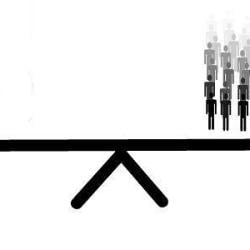And yet, who is to say that the gods that respond (if and when they do) are not actually deities with whom individuals are already familiar from their other practices, who have simply adopted these other roles? It takes a great deal of discernment to determine what is going on in situations like this, but it is a process that has occurred for a very long time. We should give the benefit of the doubt to both the gods and to the people of the past who produced devotional works for the gods in situations where these types of hitherto unknown syncretism occurred. Likewise, we should not be averse to the possibility that these kinds of syncretism can still occur in the future, given the larger mix of populations and intermingling cultures that we are experiencing in the modern world.
I like to call these types of syncretism as "polyamorotheism." Polyamory is the practice of having multiple romantic, sexual, or relationship partners. The word originated from the Pagan community itself, from Morning Glory Zell-Ravenheart; and, indeed, I have heard some people who have critiqued monotheism likewise critique all of the "mono-" aspects of society, including monogamy, as something that would not be useful for those who are not monotheistic themselves. Whatever one might imagine about these human social institutions and relational styles, the gods seem to revel in the possibility of getting together with one another. The number of male deities who have shown the capacity to give birth on their own may not be as large as female deities who have done likewise, but nonetheless, it is a potential that very likely any of them possesses.
I like to think of all the long-standing syncretisms, like Serapis, and Zeus-Ammon, and Hermanubis, and Hermes Trismegistus, as instances in which the various gods who contributed their aspects to these mixes had a relationship of some kind -- a fleeting kiss, a short fling, a long-term love affair, or a situation of broken hearts, or marriage-gone-awry . . . whatever it happened to be. What came about from that? (Let the myth-makers give us their theories in each case!) Gods and goddesses are profoundly creative beings -- as anyone familiar with the stories of Izanagi-Okami and Izanami-Okami knows all too well! -- and from the most minor of their actions can come amazing and unexpected things. Even if "birth" as such is not involved, the briefest of meetings between gods of different pantheons or even within the same pantheon can create something new, individual, and volitional, that is the product of its two "parents" in that particular meeting and what drew the two together in the first place. Thus, I think that polyamorotheism is something that has occurred, and is occurring now, and will occur again in the future.
The immanence of our deities to our lived experiences on earth has many consequences, including the expanding awareness of and pleasure over the fact that some human communities are learning to coexist, to respect, and honor one another, and to be learning from each other's mutual examples. I cannot help but think that the gods are doing likewise. At PantheaCon 2010, on the "Earth-Based Religions: Are We Really?" panel, Orion Foxwood commented that if humans think they're the only ones having conventions to figure out how to deal with problems, we're wrong, and that the same thing is occurring on divine levels even as we speak. The divine worlds and the many divine beings that exist within them -- gods and goddesses, ancestors, land spirits, heroes, angels, demons, deified mortals, egregores, natural forces, deified concepts, and even the "archetypes" that so many hard polytheist pagans argue do not exist -- are all there, and can all be recognized by us if we devote our attention, care, discernment, and all of our best creative, intellectual, emotional, physical, and spiritual faculties to making their presence known.
 P. Sufenas Virius Lupus is a founding member of the Ekklesía Antínoou (a queer, Graeco-Roman-Egyptian syncretist reconstructionist polytheist religious group dedicated to Antinous, the deified lover of the Roman Emperor Hadrian and other related gods and divine figures), a contributing member of Neos Alexandria, and a Celtic Reconstructionist pagan. You can find Lupus' work published in the Bibliotheca Alexandrina volumes dedicated to Hekate, Isis and Serapis, and Artemis, with upcoming writings and poems in the devotionals to Zeus, Pan, and the Dioskouroi. He has published a book of poems, The Phillupic Hymns (2008), and also has poems printed in the Scarlet Imprint anthology Datura: An Anthology of Esoteric Poesis (2010).
P. Sufenas Virius Lupus is a founding member of the Ekklesía Antínoou (a queer, Graeco-Roman-Egyptian syncretist reconstructionist polytheist religious group dedicated to Antinous, the deified lover of the Roman Emperor Hadrian and other related gods and divine figures), a contributing member of Neos Alexandria, and a Celtic Reconstructionist pagan. You can find Lupus' work published in the Bibliotheca Alexandrina volumes dedicated to Hekate, Isis and Serapis, and Artemis, with upcoming writings and poems in the devotionals to Zeus, Pan, and the Dioskouroi. He has published a book of poems, The Phillupic Hymns (2008), and also has poems printed in the Scarlet Imprint anthology Datura: An Anthology of Esoteric Poesis (2010).




